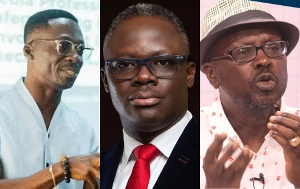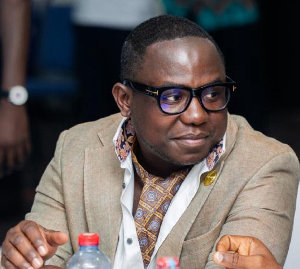By Ebo Quansah
In the era of the Russian Revolution, religion did not find favour with nation-building.
In the opinion of those who overthrew the Czars and instituted the strongest form of Communism known to mankind, religion was the opium of the masses, and was never given a look-in.
In contemporary Ghana, politics is fast taking on the role of opium for some followers of the party in power especially.
When the ruling National Democratic Congress launched its manifesto at the Sunyani Coronation Park, we were told that over 50,000 crowd watched the spectacle at the arena constructed to hold just about 10,000 spectators.
That was not the only miracle associated with the ruling party’s manifesto launch.
The document has been held up as the panacea for curing all the ills in this society, when those creating problems for the nation are the same group of people launching the document and hope to work with it.
All these though, pale into insignificant when weighed against the pronouncement of the District Chief Executive of the Akatsi North District in the Volta Region.
According to Mr. James Gunu, the administrative head of the district with its headquarters at Ave-Dakpa, incidentally, the hometown of Mr. Emmanuel Akli, Editor of The Chronicle, the NDC Manifesto, the official document with which the NDC intends to fight the 2016 Presidential and Legislative elections, “is a gift from God.” How the Almighty packaged the document from Heaven and released it with President John Dramani Mahama writing the foreword, tells everything about the mirage that is enveloping state policies, as Ghanaians meander their way to the December 7 polls.
Apparently, the belief in divine intervention to work magic on the NDC manifesto has its roots in the entire party, which now describes its delivery of services to this society based on Social Democratic principles. After eight years of virtually messing up the fortunes of Ghanaians, NDC party gurus are upbeat about the wonders to be delivered by believing in the new manifesto.
The NDC prescribes four thematic areas to propel the party in power to perform, if the people of this country decide to return President Mahama to Government House on December 7. Last week, I discussed at length what Ghanaians should expect from the concept of Putting People First.
Today, I intend to examine the Second principle: Strong and Resilient Economy, against what has happened in the last eight years. It would be difficult to convince many Ghanaians that this administration has improved their economic well-being. Government officials, on the other hand, are upbeat about the legacy they have built in the last eight years, for which reason they are convinced the people of this country would return John Mahama to Government House.
According to President Mahama in his foreword to the NDC Manifesto: “Strong and Resilient Economy represents our desire to build an economy that provides a channel for human creativity that meets the aspirations of Ghanaians to work.” In an economy that has left the large chunk of educated youth on the scrap-heap of unemployment, this assurance must be music to the ears of the ordinary people.
The snag is that in spite of roof-top advertisements of building a resilient economy since the NDC returned to Government House on January 7, 2009, many able bodied Ghanaians have failed to benefit from whatever the policy was supposed to offer. That is one reason why there appears to be very little belief in what the manifesto is promising. As you read this piece, the Association of Unemployed Graduates is swelling in its membership. One document suggests that as many as 60 percent of graduates churned out by our universities in the last eight years are idling at home, while industry and critical areas of national life remain scantily manned.
Read President Mahama’s pledge on the economy further: “It is the illustration of our commitment to build an economy that nurtures and protects the young, the old, and vulnerable; an economy that is capable of dealing with adversities such as climate change, while, at the same time, enhancing [the] life for our people.”
He said the NDC remains deeply committed to the principles and values of social democracy. “As Social Democrats, we subscribe to a compassionate political philosophy that seeks to create opportunities for all to develop to their fullest potential. We believe that the pursuit of economic prosperity for all Ghanaians can best be achieved through appropriate regulation and strategic investments. We are, therefore, committed to using the legal, fiscal and trade investments.”
On paper, the manifesto is an assuring document. It offers hope that in spite of the voodoo economics that has characterised the administration of this country for the past eight years, the NDC could still, somehow, find a winning formula.
According to the official document, the NDC vision for Ghana is to build “a prosperous nation, providing sustainable jobs through industrialisation for transformation.” But the evidence on the ground suggests that these lofty ideas have never been turned into reality.
In the beginning, so much noise was made about single digit inflation that continues to be churned out from the Ghana Statistical Services in spite of the rising cost of goods and services on the open market.
The Chronicle had an open confrontation with what we considered to be massaging of the figures. The World Bank entered the fray, and later the basket of goods used, as well as the methodology was altered. Since then single digit has been kicked to touch. The bad news for the economy is that inflation has since been rising. At the moment, inflation hovers around 16 to 17 percent per annum.
That is not the only bad news for long-suffering Ghanaians. The national currency, the Cedi, has taken much battering as a result of the failed economic policies of this administration in the past eight years. When former President John Evans Atta Mills walked to the podium at the Independence Square in Accra and was decorated as the Third Head of State of the Fourth Republic in January 2009, the cedi was exchanging at GH¢1:18 to the dollar. Now a businessman importing the same quantity of goods needs to fork out four to one for the same transaction he was performing before the NDC occupied Government House.
The policy of borrowing to fix every financial problem has led to the ballooning of the national debt. When former President Kufuor was exiting power in January 2009, this nation’s total debt, both local and external, amounted to GH¢9.5 billion.
Now Ghana is indebted to internal and external creditors to the tune of GH¢160 billion and still counting. Quite recently, it emerged that this nation needed to fork out an outrageous amount of GH¢12 billion per annum, just to service debts. Surely, Ghana is not sitting pretty!
It is the borrowing syndrome underlying the Mahamean Economic Theory with its Terkpernomics that is making this nation fail in getting the society properly moving.
Two years ago, economic gurus throughout the country were invited to assemble along the Volta River at Senchi, in the Asuogyaman District of the Eastern Region, to think through what was considered as a home-grown economic policy, as a means of stopping the leakage in the system. But the ink on the blueprint and fine lines composed along the Volta River had hardly dried out, when the nation had to seek refuge under an International Monetary Fund bail-out.
The three-tranches of US$115 million each, so far advanced, and the stringent measures recommended forced down the throats of Ghanaians have slowed down the fall of the cedi. But the draconian economic policies have resulted in many dislocations in service delivery to the people. The IMF bail-out has bitten so hard that President Mahama is signaling a halt to the programme as soon as the first stage is completed.
Addressing the 10th Biennial Conference of the Trades Union Congress in Kumasi, at which a new Secretary-General was voted in to replace Mr. Kofi Asamoah, President Mahama said the government was prepared to return to the home grown table to fashion out the next economic model to guide this nation.
The outgoing Secretary-General of the TUC spoke for the average Ghanaian, when he said that though there had been a little success under the bail-out, cost of living has increased dramatically as a result of increases in taxes, levies, utility bills and fuel prices.
Mr. Asamoah’s verdict on the economy under the NDC generally was damning. “High levels of inflation and interest rates, unstable currency, unstable power supply, and joblessness among the young people and declining levels of earnings are eroding the gains we have made so far.” It is difficult to envisage the economy performing any better under the NDC in the coming years.
The NDC manifesto, certainly, contained fine prints of intent. Evidence on the ground so far, does not support the ability of this administration to turn the economy round so easily. Like they say in Swahili, the new manifesto pledge on the economy is not yet Uhuru.
I shall return!
Opinions of Wednesday, 5 October 2016
Columnist: Ebo Quansah















